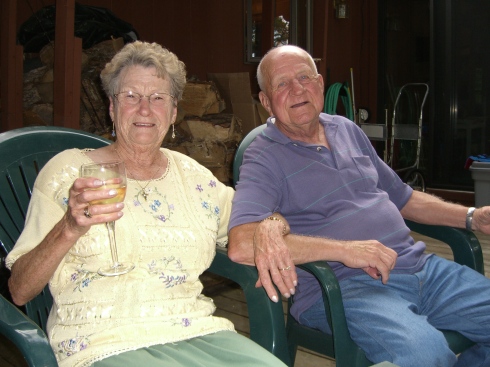There is a story I heard once about two relatives who were attending the funeral services of a wealthy family member. One of them, with a greedy glint in his eyes, leans over and whispers; “how much did he leave?“. The other looks back and responds…”All of it“. The point of the story was that when our time comes, we don’t take any of our possessions with us.
St. Francis of Assisi, who was born into a wealthy noble family, left his life of possessions and privileges to start a monastery and live a life of simplicity. His advice to those who wanted to join him was to “Wear the world like a loose garment, which touches us in a few places and there but lightly”.
The Alcoholic Anonymous organization adopted this teaching of St Francis and shortened it to the simple phrase: Wear the World Lightly. Their 12-step program for overcoming addiction uses lots of sayings to help people detach and overcome their addictions, phrases like: live and let live, let go and let God, turn it over, easy does it, and one day at a time.
All of these statements of detachment are not intended to send a message that we should be indifferent or dead to the world, or have no feelings at all. Rather their purpose is to teach people to face the world with a kind of mindful disengagement.
It is this “detachment with love” philosophy that can help motivate people to create a peaceful space within themselves, separated from the never-ending incoming arrows of uncertainty, fear, anger, and other painful events that plague our life. Practicing detachment helps people look past the daily shocks that occur, producing a change of attitude in the mind and a physical release in the body.
To wear the world as a loose garment is to acknowledge that the world and our life will always press at us and around us, but that it does not have to touch us but “lightly”. Most things are either outside our control or ultimately unimportant.
We do not need to grasp, manage, dwell on or react to everything that happens to us. We can choose instead to keep the world at an emotional distance so we can stay focused on doing the next right thing. It is an attitude that can relax the body and relieve the mind of the poisonous emotions that overcome us when we are confronted by the people, places or things that beset us.
To be in the world but not of it, is to live and move through life without being emotionally attached to everything that happens. Life can get hard, but those who wear the world lightly learn how to live in the world with their hardships, neither fighting them nor being crushed by them.
St Francis was essentially encouraging us to not sweat the small stuff. To not get annoyed or depressed when life does not go your way or when you do not get what you want. When you have lived long enough you come to understand that most of the things that bother us are small potatoes. Even death apparently, which the Dalai Lama described as a simple change of clothes.
I’ve heard it said that the secret to happiness as we age “is to care less and less about more and more“. The wise elders I have been fortunate to know in my life carried that attitude with them; they tended to let fewer and fewer things bother them as they got older. It’s not because they didn’t care, most likely it was just that they discovered through their life experience that it is possible to walk away, without anger or agitation, from some things they felt passionate about – and still live.
I happened across an on-line sermon about this same topic of wearing the world lightly by Bishop Robert Barron. From a spiritual point of view, Bishop Barron also believes that St Francis’ famous statement was an attempt to teach his followers about the importance of detachment – especially from the goods and achievements of the world.
Not because the world itself is bad – there are all kinds of good, true and beautiful things in the world – but because the things of the world are not the ultimate good and we are not meant to cling to them as though they were.
There are stories throughout the Bible about the futility of clinging on to earthly power, riches and glory. King Solomon is one of the greatest figures in the history of Israel from a standpoint of wealth and power. He was somebody who had it all; nobody was richer, nobody was more famous, nobody had richer palaces or clothes. But, as an old man, looking at all the possessions he has acquired over his lifetime, he says: “Vanity of vanities, all things are vanity!“.
The word vanity in Hebrew signifies something that is insubstantial and momentary, like wind or vapor or bubbles; something that is here for a brief time and then it is gone. Solomon has experienced everything: power, sensual pleasure, wisdom, honor and wealth. He has built up a reserve of wealth through his knowledge and skills and yet when he is gone, he must leave all his property to others who have not labored over it and do not deserve it.
It is not uncommon to hear complaints like this from men as they become old and infirm; “I gave my whole life to my business, I worked hard and I made a fortune. Now I’m an old man and I’m surrounded by ungrateful children and grand-children; and I’ve done all this work and yet these people are going to inherit all my wealth. What’s it all been about“?
If you live to be old enough, at some point, you finally come to realize that everything in this world has a quality of evanescence – it disappears and does not last. It is a good thing if you have been successful and built up a fortune – but it’s not going to last. Because you are going to fade away and it’s all going to go to somebody else.
Should we just be depressed then? Father Barron says no, not depressed, instead we should be detached. Our wealth, power, pleasure and the esteem of other people. It’s good. We should take it in and then let it go. We should enjoy it the way you enjoy a firework going off. Learn to live in the present moment, savoring what we can, but then letting it go.
Why? Because we come to realize that the truly good and beautiful things belong to a higher world. We can sense them in the good things of this world but none of our earthly things last and so if we cling to them, what happens is they disappear, they crumble as we try to grasp at them. Rather see them, appreciate them and then let them go.
We can get caught in an addictive pattern when we cling to the goods of the world. You worry about them so you say to yourself, oh no I better get more. Instead, we would be wise to remember the cautionary parable of the rich fool told by Jesus:
“The ground of a certain rich man brought forth abundantly. He reasoned within himself, saying, ‘What will I do, because I don’t have room to store my crops?’ He said, ‘This is what I will do. I will pull down my barns, and build bigger ones, and there I will store all my grain and my goods. I will tell my soul, “Soul, you have many goods laid up for many years. Take your ease, eat, drink, be merry.”‘ “But God said to him, ‘You fool, this very night your soul is required of you. The things which you have prepared— whose will they be?’
Luke 12:16-21
St Francis asks us to cultivate an attitude of detachment in our life. To stop clinging and hanging on to the things of the world. The more we cling to them, the more we become imprisoned by them. We’ll become bitter, angry , empty if our only focus is on the acquisition of ephemeral things. But if we practice the proper spiritual attitude of detachment and keep our eyes on the true and beautiful things that do not fade away then we will know how to handle the goods of the world as they come to us.
Fr Barron closes his sermon by emphasizing again that wealth in itself is not the problem. He points out that wealthy people can be saintly when they know how to use their wealth, how to wear it lightly and how to become generous with it. The only thing we take with us into the life to come is the quality of our love and what we’ve given away on earth. So, we should forget about trying to fill up our lives with bigger barns; true joy in life comes through building up our treasure in heaven.
The publication of this particular blog represents a milestone for me and the achievement of a goal I set for myself way back in 2013 when I posted my very first Words to Live By blog entry. I have been publishing this monthly blog for almost 10 years now and and have managed to author 100 different blog entries in that time.
I have attempted in this collection of postings to communicate ideas and philosophies that have helped me along the way and given my life direction and meaning. It has been a wonderful mental exercise for me and a labor of love that has helped me recognize things that make life interesting and wonderful. I hope my readers have discovered some of their own words to live by that will be of specific value to them in their own life.
In the spirit of “wearing the world lightly”, I plan to cut back on my blogging activities moving forward so that I am can devote more time focusing on doing the next right things in my life that will increase the quality of my love. I don’t plan to walk away from blogging completely though, as there are always more words to live by to be discovered and examined.
So, keep an eye out for the occasional future posting from me; and until then, may the blessings abound in your life.











